
Program Overview
We understand these are uncertain times and want to help you keep your goals on pace.
PC AGE’s comprehensive program provides both fundamental and advanced level courses and are designed to meet industry certification requirements. No prior computer experience necessary.
Career-focused approach
At PC AGE, preparation is key and it starts with our program structure. With each main course we teach, there is a companion course that focuses on two career objectives:
Training for a technical interview by asking and explaining hundreds of questions that will also prepare them for related Microsoft, CompTIA, and Cisco certification exams. Ensure students are ready to do the job by working on real-world projects and all possible scenarios as independently as possible.Intensive training and preparation
- Courses taught by our instructors are also available online to our students to reinforce the concepts learned in the classrooms. These online modules include contents, quizzes, graphics, and simulated hands-on exercises.
- You will go through hundreds of hands-on exercises and projects to prepare you for real-world situations and problems.
- All students will be required to submit a final graduation project. This final project tests all skills needed to work as an Internetwork Engineer.
Program Certifications
The program includes preparation for the eight designations below. Obtaining these certifications provides credibility, industry recognition, and the best alternate to experience to help you get a job with no experience in the IT field.
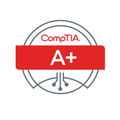
CompTIA A+® Certification
CompTIA A+ certification validates the latest skills needed by today’s computer support professionals. It is an international, vendor-neutral certification recognized by major hardware and software vendors, distributors and resellers. A+ certification confirms a technician’s ability to perform tasks such as installation, configuration, diagnosing, preventive maintenance and basic networking. Exams also cover domains such as security, safety and environmental issues and communication and professionalism.
A+ certification is part of the certification track for corporations such as Microsoft, Hewlett-Packard, Cisco and Novell. Other technology companies, including CompuCom and Ricoh, have made CompTIA A+ certification mandatory for their service technicians.
Technical Role Examples: IT Technician, Enterprise Technician, PC Technician & Help Desk Support
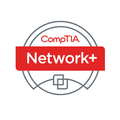
CompTIA Network+® Certification
CompTIA Network+ certification validates the knowledge and skills of networking professionals. It is an international, vendor-neutral certification that recognizes a technician’s ability to describe the features and functions of networking components and to install, configure and troubleshoot basic networking hardware, protocols and services.
The demand for skilled network support professionals continues to grow, and the CompTIA Network+ certification is a valuable credential to help start or enhance a networking career. In fact, many IT certifications integrate CompTIA Network+ into their curriculums. Microsoft and other corporations such as Novell, Cisco, HP, Lotus and 3Com also recognize CompTIA Network+ as part of their certification tracks.
Technical Roles Examples: Systems Administrator, Web Server Administrator
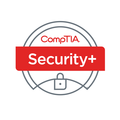
CompTIA Security+® Certification
CompTIA Security+ Certification tests the security knowledge mastery of an individual with two years on-the-job networking experience, with emphasis on security. It covers industry-wide topics, including communication security, infrastructure security, cryptography, access control, authentication, external attack and operational and organization security. Security+ is an elective or prerequisite to advanced security certifications.
CompTIA Security+ is an international, vendor-neutral certification that proves competency in system security, network infrastructure, access control and organizational security.
Major organizations that employ CompTIA Security+ certified staff include Booz Allen Hamilton, Hewlett-Packard, IBM, Motorola, Symantec, Telstra, Hitachi, Ricoh, Lockheed Martin, Unisys, Hilton Hotels Corp., General Mills, the U.S. Navy, Army, Air Force and Marines.
Technical Role Examples: Network Security Administrator, Security Specialist or Network Security Technician
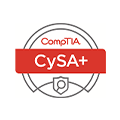
CompTIA CySA+® Certification
The CySA certification helps advance IT security practitioners within an enterprise. It certifies analytical thinking and includes threat management, vulnerability management, intrusion detection and response, and the use of enterprise-level security tools to monitor and respond to incidents. CySA has a skills-based approach to security, whereas Security+ is the foundational knowledge of security.
Technical Role Examples: Information Security Analyst, Incident Responder, Security Engineer, Network Engineer.
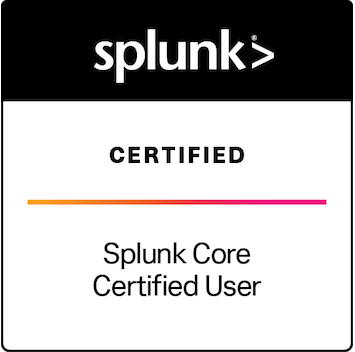
Splunk Core Certified User
The Splunk Core Certified user demonstrates the searching abilities, using fields and lookups, basic statistical reports, alerts creation and dashboards of the holder. It tests an individual’s knowledge and skills in using Splunk software for data analysis and visualization. The exam covers various subjects concerning the Splunk platform, such as data inputs and parsing, searching and reporting, field extraction and visualization, and the creation of dashboards.
Technical Role Examples: Security Operations Center Analyst, IT Administrator, Splunk Cloud Administrator.
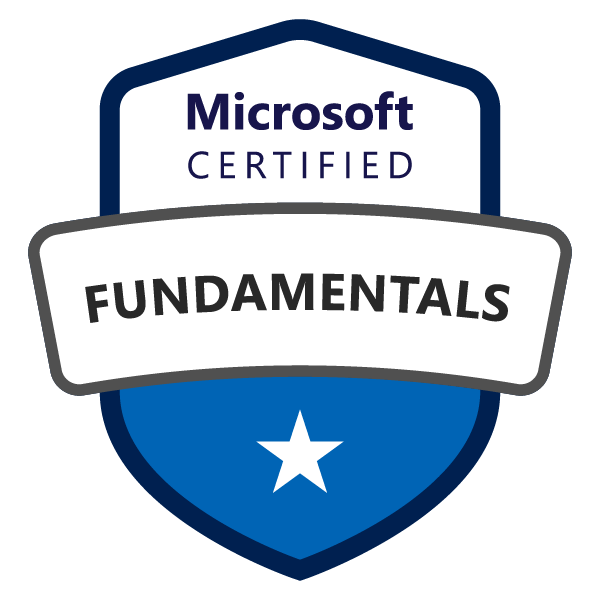
Microsoft Certified: Azure Fundamentals
The Microsoft Azure Fundamentals certification validates your basic knowledge of cloud services and how those services are provided with Azure. Candidates will be able to demonstrate a fundamental knowledge of cloud concepts, along with Azure services, workloads, security, privacy, pricing, and support.
Knowledge of cloud computing models, and services, such as public, private, and hybrid cloud, in addition to infrastructure as a service (LaaS), platform as a service (PaaS), and software as a service (SaaS). It is recommended to have familiarity with concepts of networking, storage, compute, application support, and application development.
Technical Role Examples: Senior Systems Administrator, IT Support Engineer, Data Analytics Engineer (Azure), Windows Migration Specialist.
Download the Course Outline here
Worried about costs?
Speak to a representative to find out which financial aid solutions can be applied to you.

